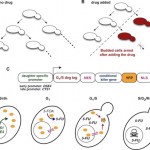aging
The New York Times' latest "Room for Debate" discussion is entitled "2025: A Lot of Old People on the Roads," and it introduces the topic this way:
...the number of drivers 70 and over is expected to triple in the next 20 years in the United States. Older drivers are more likely to be injured, and they often reach the point where they stop driving voluntarily, even before someone takes their licenses away.
How will they get around, given that most of them don't live in cities or transit-friendly planned communities? What should transportation planners be doing, if anything, to prepare for…
A new study identifies a likely cause of rapid degeneration in some Alzheimer's patients. The results of this study may lead to improved treatment.
But first, let's look at the method used in this study, because that may be almost as important as a development. And for this, we will use a sports analogy.
Let's say there's an allele (an allele is a variant of a gene) that can boost your ability to play baseball. It really works. It causes an eye-hand coordination thing that improves batting, catching, and also affects your perception of movement in 3D space so you never miscalculate…
Neurodegenerative diseases (i.e. Alzheimer's and Huntington's) often involves the formation of aggregates of proteins in a patients' brain, correlated with the process of degeneration. Some of these proteins are unique to the specific disease and others are commonly found in healthy individuals but also occur intertwined with the disease-linked types. Until now, these "common proteins" were thought to be an effect of sampling the tissues and were ignored as background. A new paper out today in PLoS Biology suggests, however, that these protein aggregates may be linked to aging. The main…
For someone in her mid-30s, I have a fairly large experience of being someone's caregiver. In high school, 'I began working in a nearby nursing home. I can't remember quite what drove me to seek that work out - it was not the kind of work that most teenagers I knew did. I think what intrigued me about it was its importance - as a teenager seeking meaning, caring for people at the end of their lives seemed urgent. It was only later that I came to realize that taking care of the elderly and disabled was, in our society, viewed as not onlyl not urgent, but not integral or important. Even as…
The following post was originally published on Obesitypanacea.com on October 7, 2009.
As many of our readers know, I performed my MSc under the direction of Dr Bob Ross at Queen's University (Peter recently completed his PhD in the same lab). Dr Ross is a world leader in the measurement of body fat and body fat distribution, which is why many of our publications focus on the associations of various body fat depots with markers of metabolic risk. During my time at Queen's I was also fortunate to work with Drs Jen Kuk and Lance Davidson (now at York and Columbia respectively),…
My labmate Bruno's newest paper, "A synthetic circuit for selectively arresting daughter cells to create aging populations" came out today in the journal Nucleic Acids Research (and it's open access!). Using a cleverly designed genetic circuit that activates cell growth arrest in newly divided cells only in the presence of a drug, Bruno was able to create a population of yeast made up of only old cells, called the "daughter arrester."
You would think that yeast, being so single celled and bread-y, wouldn't be able to tell us much about human biology or anything as complex as aging, but many…
I serve on a committee at my synagogue that brings in speakers every year for a series of talks and special meals. It is a small comittee, and before I joined, the average age of the participants was probably close to 70. The former chair is a formidable and funny woman in her early 90s, who has been a member of our shul since the 40s and who remembers everything. There are two older couples in their 60s, a woman in her 60s, myself at 37 and a friend of mine in his early 40s who just joined, pressed into it by desperate pleas for help and by the fact that it is impossible to deny Sadie,…
Recently I've been seeing a lot of Chris Patil's posts over at Ouroboros on Twitter. Worth checking out. He's hosting on the Hourglass on the biology of aging right now, though readers of this weblog might find Did aging evolve to prevent epidemics? of more interest.
